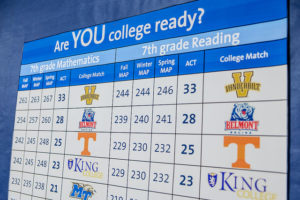One of the most important goals of Tennessee’s public education system, and one of the many changes and improvements that have surrounded this system over the past several years, is to ensure that our students graduate from high school ready for college and career. Does that mean that students who opt not to attend college should be considered educational failures? Of course not. But as Education Post’s Peter Cunningham wrote recently, a successful K-12 system will guarantee that postsecondary education is a feasible option for any student who wants it.
College readiness requires high academic standards and quality teaching that give students the knowledge and skills they need to succeed in the classroom, but preparing students academically is not enough. They also need support from teachers, parents, guidance counselors, school leaders, community members, and their peers as they navigate the notoriously overwhelming college search, application, and admissions processes.
 I worked for three years as an admissions counselor for Vanderbilt University, and in that arena we spoke not of the achievement gap, but of the information gap. Low-income and minority students in Tennessee and across the country often lack the information, skills, and “know-how” required to navigate the transition between high school and college. Because high school guidance counselors are charged with so many laborious tasks throughout the year, including managing the state testing procedures and creating student schedules, the responsibility for helping students find and enroll in the right school for them is shared by all of us.
I worked for three years as an admissions counselor for Vanderbilt University, and in that arena we spoke not of the achievement gap, but of the information gap. Low-income and minority students in Tennessee and across the country often lack the information, skills, and “know-how” required to navigate the transition between high school and college. Because high school guidance counselors are charged with so many laborious tasks throughout the year, including managing the state testing procedures and creating student schedules, the responsibility for helping students find and enroll in the right school for them is shared by all of us.
So what should high school students be thinking about right now in regards to college, and what can we be doing to support them? I’ve offered a few suggestions below to get you and your students thinking about how they can attack this process efficiently and successfully.
The college search: As early as freshman or sophomore year, students should be thinking about the type of school they would like to attend. Making lists of desired characteristics – location, number of students, availability of majors and extracurricular activities, etc. – can quickly narrow the list of over 4,000 U.S. colleges and universities to a more manageable size. The College Board’s interactive search tool is a great way to start this process and get students thinking about what they want in a school.
High school course selection: When selecting students, college admissions offices look not only at what kinds of grades a student is earning but also at what kinds of classes he or she is taking. Specifically, they want to know if their applicants will be able to hold their own when faced with college-level material. Students should challenge themselves as much as possible without dooming themselves to failure, and they need educators’ guidance to find that sweet spot between a schedule filled with “easy A’s” and a transcript filled with F’s.
Extracurricular involvement: Colleges are not just looking for strong students to fill the classroom, but also for involved community members who will fill their sorority houses, concert halls, and lacrosse rosters when classes are over. High school is an excellent time for students to explore and identify their nonacademic interests, as well as to establish their commitment and leadership skills for themselves and for those who will be reading their resumes in the future.
Financial aid: The cost of college is perhaps the most talked-about, but also the most misunderstood, concern related to college-going today. All students should receive guidance in completing the Free Application for Federal Student Aid (FAFSA), but they should also be exploring the need-based and merit-based aid options at their specific schools of interest. By law, every college and university financial aid website must include a net price calculator, which students and parents can use to get a personalized estimate of their expected family contribution (EFC) at that particular school. (For reference, here is the University of Tennessee’s Net Price Calculator.)
Relationship-building: The best and worst thing about the college search and application process is that it comes right at the time in students’ lives when they are developing their independence, self-advocacy, and communication skills, and parents and educators can use this opportunity to move that process along. Students should be reaching out – on their own – to their guidance counselors for help with applications, to teachers for advice and letters of recommendation, to financial aid offices for information on college costs, and to admissions offices for updates on their admissions statuses. Building these skills now will not only help them get to the college of their choice, but also give them an important leg up in college and beyond.
